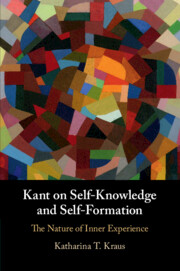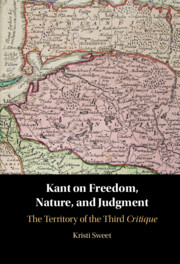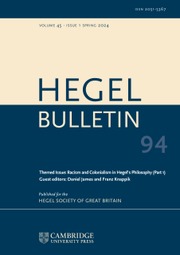Kant on Self-Knowledge and Self-Formation
The Nature of Inner Experience
$32.99 (F)
- Author: Katharina T. Kraus, University of Notre Dame, Indiana
- Date Published: August 2022
- availability: Available
- format: Paperback
- isbn: 9781108812757
$
32.99
(F)
Paperback
Other available formats:
Hardback, eBook
Looking for an examination copy?
If you are interested in the title for your course we can consider offering an examination copy. To register your interest please contact [email protected] providing details of the course you are teaching.
-
As the pre-eminent Enlightenment philosopher, Kant famously calls on all humans to make up their own minds, independently from the constraints imposed on them by others. Kant's focus, however, is on universal human reason, and he tells us little about what makes us individual persons. In this book, Katharina T. Kraus explores Kant's distinctive account of psychological personhood by unfolding how, according to Kant, we come to know ourselves as such persons. Drawing on Kant's Critical works and on his Lectures and Reflections, Kraus develops the first textually comprehensive and systematically coherent account of our capacity for what Kant calls 'inner experience'. The novel view of self-knowledge and self-formation in Kant that she offers addresses present-day issues in philosophy of mind and will be relevant for contemporary philosophical debates. It will be of interest to scholars of the history of philosophy, as well as of philosophy of mind and psychology.
Read more- Offers a novel view of Kant's theory of self-knowledge and personhood
- Provides a new, systematically coherent and textually comprehensive account of Kant's notion of 'inner experience'
- Develops a cogent account of human individuality that addresses present-day issues in philosophy of mind and psychology
Reviews & endorsements
‘Katharina T. Kraus provides us with an original and valuable exploration of Kant's specifically regulative idea of the soul and the relation of this idea to inner experience and self-formation. The topics she treats are as important philosophically as they are as matters of Kant interpretation, and her analysis represents a welcome addition to the existing literature.' Julian Wuerth, Vanderbilt University
See more reviews'Katharina Kraus’ important book offers a careful discussion of Kant’s account of the self and self-awareness that is both hermeneutically and philosophically rewarding. On her highly original reading of Kant, our self or person is not something we find, but something we must achieve. Kraus develops this deep and difficult idea with impressive ingenuity and sophistication.' Marcus Willaschek, Goethe-University Frankfurt
'This account of Kant’s psychology, which Kraus establishes with great patience, analytic clarity, technical accuracy, and systematic consequence, is highly innovative and intriguing.It will certainly stir vivid debates in the years to come. Chapters 3 and 4 are particularly convincing, attesting to an excellent knowledge of the existing literature and today’s philosophical debates.' Stefanie Buchenau, Journal of the History of Philosophy
‘Scholars have provided countless studies of Kant’s theory of object cognition. Katharina Kraus has produced the first positive and comprehensive account of Kant’s theory of self-cognition. It is a signature achievement.’ Patricia Kitcher, European Journal of Philosophy
‘Kraus’s ambitious and impressively researched book is bound to generate a good deal of debate for the foreseeable future. Anyone interested, not only in Kant’s views on self-knowledge and personhood but also in Kant’s critical system as a whole, should have this book on top of their to-read list.’ Béatrice Longuenesse, Philosophical Review
‘Katharina Kraus’s new book is an impressive, wide-ranging treatment of Kant’s theory of self-consciousness and selfhood … its strength lies in the insight she displays in seeing how texts that are familiar to all students of the Critique can be read with subtlety and discernment in new and interesting ways. The account that emerges provides Kant with original answers to questions most readers (I speak of and for myself here) have not even known how to ask before reading her book … For I confess that she has turned me into a learner and an inquirer into the topics she is discussing.’ Allen Wood, Kantian Review
‘Katharina Kraus’s Kant on Self-Knowledge and Self-Formation … provides a careful and systematic investigation, along with a nuanced and innovative interpretation, of several overlapping parts of Kant’s philosophy of mind and psychology. It is successful to such a high degree that it is surely the ‘state of the art’ for all future discussion of its topics.’ Clinton Tolley, Kantian Review
‘This book deserves to become a standard reference point for any discussion of Kant’s view on the self.’ Pirachula Chulanon, Toronto Metropolitan University
‘[A] masterful work on Kant’s theoretical philosophy and an important contribution to the philosophy of mind.’ Ekin Erkan, Kant Studien
Customer reviews
Not yet reviewed
Be the first to review
Review was not posted due to profanity
×Product details
- Date Published: August 2022
- format: Paperback
- isbn: 9781108812757
- length: 320 pages
- dimensions: 228 x 152 x 16 mm
- weight: 0.46kg
- availability: Available
Table of Contents
Introduction: from inner experience to the self-formation of psychological persons
Part I. The Appearing Self:
1. Inner sense as the faculty for inner receptivity
2. Temporal consciousness and inner perception
Part II. Self-Consciousness and the 'I' of the Understanding:
3. The form of reflexivity and the expression 'I think'
4. The conditions of self-reference
Part III. The Human Person and the Demands of Reason:
5. The guiding thread of inner experience
6. The demands of theoretical reason and self-knowledge
7. The demands of practical reason and self-formation
Epilogue: individuality and wholeness.
Sorry, this resource is locked
Please register or sign in to request access. If you are having problems accessing these resources please email [email protected]
Register Sign in» Proceed
You are now leaving the Cambridge University Press website. Your eBook purchase and download will be completed by our partner www.ebooks.com. Please see the permission section of the www.ebooks.com catalogue page for details of the print & copy limits on our eBooks.
Continue ×Are you sure you want to delete your account?
This cannot be undone.
Thank you for your feedback which will help us improve our service.
If you requested a response, we will make sure to get back to you shortly.
×


